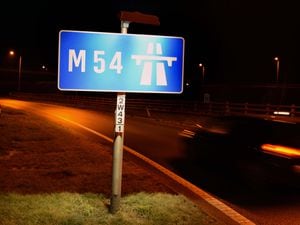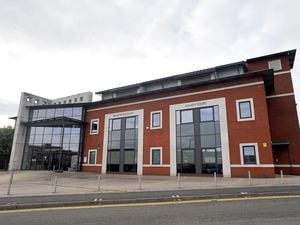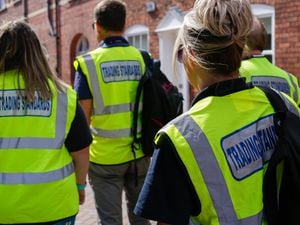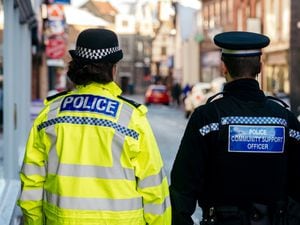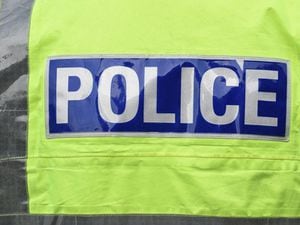Shropshire great defied adversity
Tim Brookshaw, the champion jump jockey – a Shropshire sporting great who wouldn't stay down.
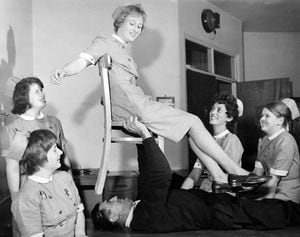
Faced with a life-changing fall at Aintree in December 1963, with an iron will he battled back, overcoming paralysis not only to walk again, but to ride and train horses.
Then, in early November 1981, he was thrown once more while out for a gallop. This time there was no fairytale comeback. His neck broken, he died at Oswestry Orthopaedic Hospital five days later, aged 52.
Stanley James Brookshaw, always known as Tim, who could number celebrities among his friends and was regularly invited to the birthday parties of the Queen Mother, is buried in a quiet corner of the cemetery behind Hodnet Church.
Now his story and that of the Brookshaw family is told in a new book, "Fearless, The Tim Brookshaw Story," written by well known Midlands racing writer Chris Pitt.
Brookshaw's 1963 fall on a horse called Lucky Dora at Aintree, and an even more horrendous fall at Aintree by his weighing room colleague Paddy Farrell, led to the creation of what was to become The Injured Jockeys Fund.
“Less remembered is quite how completely Tim refused to bow to adversity, starting with the Paralympic Games in Tokyo, in discus, javelin and weightlifting. He rigged himself with devices to continue most tasks on the farm, and incredibly rode in a mile and three quarters charity flat race at Navan in 1977,” writes broadcaster and writer Brough Scott in his foreword.
Brookshaw came from a farming background, and even at the peak of his riding career he was still combining his farming work at his base at Tern Hill, near Market Drayton, with his riding commitments.
He rode his first winner at the now defunct racecourse at Woore in May 1948 and his final winner at Nottingham in December 1963. In all he rode a total of 555 winners and in 1958-59 he partnered 83 winners and was crowned champion jockey. The following year he rode 90 winners, but was denied a second title by Fred Winter.
However his riding career is best remembered by a race in which he finished second. In 1959 he partnered a horse called Wyndburgh for trainer Ken Oliver in the Grand National. Everything was going to plan as they approached Becher’s Brook on the second circuit.
Brookshaw recalled: “As l landed I felt something go. I didn’t know exactly what. I leaned across to Michael Scudamore – we were very nearly together – and said to him: ‘My bloody iron has gone’. He did not reply, He seemed very tense."
He took his foot out of the other iron – stirrup – and rode the last eight fences of the Grand National without stirrups, very nearly overhauling the winner, Oxo. Brookshaw would later reflect that failing to win the Grand National was his only regret.
This so-near-and-yet-so-far story made headlines around the world, but ironically it was at Aintree again four years later that he made the headlines for all the wrong reasons when he suffered that life-changing fall in a hurdle race. Paralysed from the waist down, he was told in hospital that he would never walk again.
But they had reckoned without the Brookshaw iron will. Although there was no feeling in his legs, he kept up the strength in his shoulders with a set of chest expanders. In less than two months, with his legs still useless, he hauled himself out of his bed into a wheelchair.
He was determined to ride again. Swimming, exercise but most of all determination, was the daily diet.
He competed in the first paraplegic sports day at Oswestry Orthopaedic Hospital and later the Paraplegic Games at Stoke Mandeville. And such was his progress that just 10 months after his accident he was selected to represent Great Britain at the Tokyo paralympics, competing in javelin and discuss throwing and also in weightlifting, winning a silver medal in the javelin event.
And still to get back on a horse meant everything. The man with a 12 inch plate in his back and a bolt through his left ankle was back riding within eight months of breaking his spine by using a rope to drop into the saddle like a medieval knight.
By the early seventies he was training racehorses in his own right at Lostford Manor, riding out and schooling his small but competitive string.
But in November 1981, the man who refused to admit defeat rode out for the final, fatal, time. He took his mount up the road for a steady gallop.
According to the book: “The horse was bucking and kicking and proving difficult to handle. Tim had ridden that sort many times before. Except that this time the horse reared up and then stumbled and fell, firing Tim over his head. As he lay on the ground, the horse got to his feet and kicked him in the neck. For the second time in his life he was paralysed.”
The book tells both Brookshaw's story and that of a family steeped in National Hunt racing. Brother Peter, an accomplished amateur rider who won the Foxhunters at Aintree. Nephew Steve trained Lord Gyllene to win the 1997 Grand National.
"Fearless, The Tim Brookshaw Story" is written by Chris Pitt and costs £14.95

